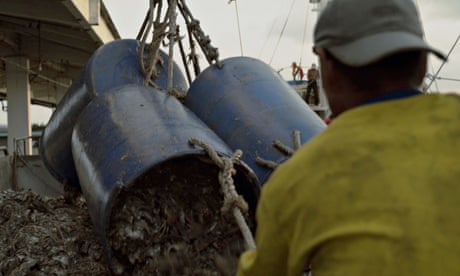Retailers must do more to stamp out human rights abuses by their suppliers after a Guardian investigation found prawns sold in the UK were produced with the help of slaves, ministers are warning.
Jenny Willott, the consumer affairs minister, said retailers must have a policy on sourcing ethical products, as ignoring the consumers' concerns about forced labour and dangerous working conditions could risk putting them out of business.
In the first ministerial intervention since the exposé two weeks ago, Willott ordered the British Retail Consortium (BRC) to produce new guidance on urgent steps its members must take to improve transparency about human rights abuses linked to food, drink, clothing and other products.
Karen Bradley, Home Office minister for modern slavery, also called on firms to stop working with suppliers with links to forced labour, saying they have a "social responsibility to ensure that those that they do business with are not involved in the exploitation of others".
In a separate development, Foreign Office minister Lady Warsi said the coalition will look to raise concerns with Thailand about the use of slaves to produce prawns sold in UK stores. The senior Conservative acknowledged that the UK's influence is "limited" but said the government will air the issue in diplomatic discussions and expects Thailand to investigate.
Their responses are far stronger than the government's initial reaction to the revelations. Asked about the allegations at the time, David Cameron's official spokesman said consumers had to choose whether to eat seafood produced through slavery. "Consumer standards and retail standards and social responsibility is often driven by consumers and rightly so," he said.
The Guardian found that slaves involved in prawn production are being forced to work in Thailand for no pay for years at a time, under threat of extreme violence. It found prawns farmed with the help of slavery are sold in leading global supermarkets including Tesco, Walmart, Costco and Carrefour, among others. At the time UK retailers involved condemned slavery and human trafficking but would not depart from pre-prepared statements.
UK ministers have until now been silent on the subject, but the US state department last week relegated Thailand to the lowest rank in its Trafficking in Persons (TiP) report – meaning it is now ranked no better than North Korea, Iran or Saudi Arabia in the way it protects workers from abuse.
In a strongly-worded letter to the BRC, due to be sent on Wednesday, Willott highlighted the findings of the Guardian probe, writing: "Following the anniversary of the Rana Plaza disaster earlier this year, we saw another high profile case involving oppressive labour practices in the production of prawns in Thailand.
"Consumers are increasingly aware of these issues and concerned about them. As a result of this public interest, we have an opportunity to highlight those companies taking positive action and encourage others to make a real difference."
Willott's letter stops short of Labour's demands for the coalition to force firms to declare any links to suppliers with suspected links to slavery in their annual reports. But it makes clear retailers should be doing more to put transparency about supply chains at the heart of their business.
She said: "All companies, including those in the retail sector, need to make sure they are giving the right information to their customers and are being open about their supply chains. Shoppers more than ever want to know how what they buy got from the factory to the shelf. They are also not afraid to speak up or vote with their feet if they think those producing their goods are being abused or exploited.
"Businesses must be aware that ethical sourcing and transparency about their supply chains must be part of their policy, not an add-on. They ignore consumer concerns at their peril and even run the risk of going out of business."
Willott singled out high street giant Marks & Spencer for its long-standing and high profile "Plan A" ethical policy and the fashion retailer H&M for its clarity on ethical sourcing and information about its clothing ranges.
The BRC's guidance – due to be published in the autumn – will mention existing good practice such as human rights reporting (which some UK-based firms already routinely do), information on ethical auditing and membership of various accreditation schemes such as the Ethical Trading Initiative.
But the government will say on Wednesday that it wants companies to be doing much more – asking the BRC to take the lead – in the face of the results of a new poll showing that shoppers are taking the issue of ethical practices very seriously in their shopping habits.
Findings from an Ipsos Mori poll published by the Department for Business show that more than four in five (83%) shoppers say the ethical standards of retailers matter a great deal to them.
Two in five (39%) admit their shopping decisions are influenced by this even given the squeeze on household incomes.
The same proportion (38%) say they are willing to spend more on a product if a company acts in an ethical way.
Environmental campaigners and human rights groups called the revelations of slavery in the prawn supply chain a wake-up call for consumers and urged shoppers to boycott cheap Thai prawns and other imported seafood if supermarkets cannot guarantee the goods have been sourced ethically.

Comments (…)
Sign in or create your Guardian account to join the discussion